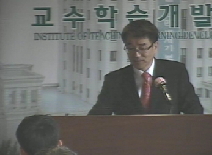This study is based on the hypothesis that, with the consolidation of cabinet’s role and identity in the North Korea, each organization in cabinet tends to prioritize its organizational self-interests and identity over governmental or national inter...
http://chineseinput.net/에서 pinyin(병음)방식으로 중국어를 변환할 수 있습니다.
변환된 중국어를 복사하여 사용하시면 됩니다.
- 中文 을 입력하시려면 zhongwen을 입력하시고 space를누르시면됩니다.
- 北京 을 입력하시려면 beijing을 입력하시고 space를 누르시면 됩니다.

북한 내각 기구의 대남 담화에 나타나는 관료제적 특성 -조국평화통일위원회의 담화 성격 변화를 중심으로- = Bureaucratic features in North Korean cabinet’s statements on South Korea - Focusing on the discourse changes of the Committee for the Peaceful Reunification of Korea -
한글로보기부가정보
다국어 초록 (Multilingual Abstract)
The Ministry of Defense maintained its offensive posture toward South Korea, reinforcing its identity, even if the leader shifted to appeasement policy to South Korea. The Ministry of Foreign Affairs began issuing appeasement statements to the U.S., its major counterpart, following the leader's conciliatory gesture toward U.S. The Committee, however, continued its offensive political stance toward South Korea even after the 2018 inter-Korea Summit, which seems like an irrational choice. It also contrasts from the situation in 2000, when the Committee issued appeasement statements after the 2000 inter-Korea Summit.
This paper argues that this difference is resulted from the increased political responsibility of the Committee following the shift of its political position from a party-affiliated organization to the cabinet member, and the weakening of social organizations involved in inter-Korea social exchanges. The policy toward South Korea contains high risks, which even could threaten the organization’s existence. Its reorganization to the cabinet might increase this risk perception. At the same time, the weakening of social organizations has deprived the Committee's partners to share its political responsibility. These environmental changes increased the Committee’s political responsibility, making it more passive in carrying out appeasement policy. This shows that organizations in the North Korean cabinet prioritize their organizational survival and interests over the leader’s policy goal.
This study is based on the hypothesis that, with the consolidation of cabinet’s role and identity in the North Korea, each organization in cabinet tends to prioritize its organizational self-interests and identity over governmental or national interests. To test this hypothesis, it analyzes statements announced by the Ministry of Foreign Affairs, the Committee for the Peaceful Reunification of Korea(the Committee), and the Ministry of Defense from 2016 to 2021, using the text-mining analysis and a literature review.
The Ministry of Defense maintained its offensive posture toward South Korea, reinforcing its identity, even if the leader shifted to appeasement policy to South Korea. The Ministry of Foreign Affairs began issuing appeasement statements to the U.S., its major counterpart, following the leader's conciliatory gesture toward U.S. The Committee, however, continued its offensive political stance toward South Korea even after the 2018 inter-Korea Summit, which seems like an irrational choice. It also contrasts from the situation in 2000, when the Committee issued appeasement statements after the 2000 inter-Korea Summit.
This paper argues that this difference is resulted from the increased political responsibility of the Committee following the shift of its political position from a party-affiliated organization to the cabinet member, and the weakening of social organizations involved in inter-Korea social exchanges. The policy toward South Korea contains high risks, which even could threaten the organization’s existence. Its reorganization to the cabinet might increase this risk perception. At the same time, the weakening of social organizations has deprived the Committee's partners to share its political responsibility. These environmental changes increased the Committee’s political responsibility, making it more passive in carrying out appeasement policy. This shows that organizations in the North Korean cabinet prioritize their organizational survival and interests over the leader’s policy goal.
동일학술지(권/호) 다른 논문
-
김정은 시기 조선인민군 정체성 변화에 관한 연구 -김정일 시기와의 비교를 중심으로-
- 연세대학교 통일연구원
- 곽은경
- 2024
- KCI등재
-
탈북민 수는 왜 늘어나지 않는가? -디지털 권위주의와 생체인식기술 발전-
- 연세대학교 통일연구원
- 장양규
- 2024
- KCI등재




 KCI
KCI KISS
KISS







